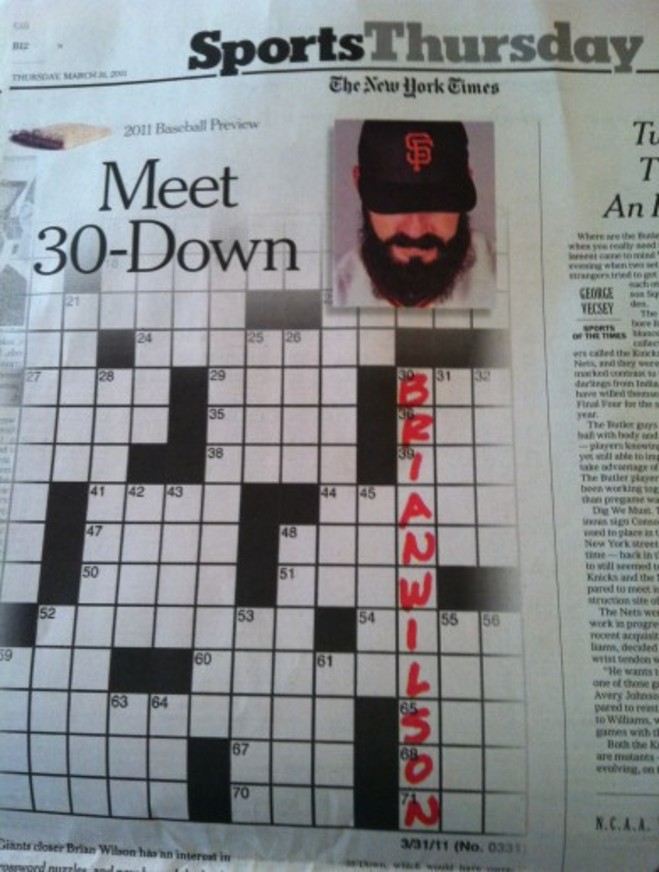IN NO PARTICULAR order every Sunday, we flick back through the week’s newspapers, websites, blogs and magazines to bring you the best sports writing.
1. “Brian Wilson, the one-of-a-kind closer for the champion San Francisco Giants, has an abiding interest in crossword puzzles. He said that he started doing The New York Times crossword when he was 12, that he remembered “there would always be a sports star in there” and that he thought that one day he might succeed as a baseball player and then maybe he could be a clue, too. Now he is, just in time for opening day.”
Take a bow the New York Times and pitcher/oddball Wilson. Thanks to John Riordan for heads-up earlier in the week.
2. “There was more of this bullying ignorance dressed up as bluff common sense last week when Geoff Boycott opined that Yardy was actually quitting the England squad because he simply wasn’t good enough and had been upset by Boycott’s criticism of his bowling.”
The Sunday Independent’s Eamon Sweeney on the predictable reaction to Michael Yardy’s depression.
3. “You’re a mentally ill paedophile. It’s the sort of accusation you hope to avoid and, frankly, it seemed a bit of an over-reaction to my suggestion for
restructuring the World Cup. Most journalists have suffered something similar; in the hour before kick-off , in fact, you can pretty much guarantee that at least one conversation in any given press-room will be a discussion of what writers have been called on their blogs that week. Th is is interactivity, the new holy grail of journalism.”
Jonathon Wilson scratches his head at the comments his pieces often prompt from readers.
4. “I lost my virginity the night the Toronto Blue Jays won their first World Series — October 27, 1992, if you, like me, were scoring at home — and I have a scar on my head from the night they won their second. Joe Carter hit his home run off Mitch Williams over the left-field wall, and I jumped headfirst into the TV set that was suspended from our dorm room’s ceiling. Hours later, I was still running through the hallways, naked and bloody.”
Esquire magazine’s Chris Jones explains how you can fall in love with baseball all over again.
5. “There is, in his mind, no greater challenge than Augusta National and after two disappointing trips to the Masters in a row, Harrington is in the business of looking ahead to a more rewarding trip up Magnolia Drive next week for his 11th campaign to don a coveted Green Jacket. So as he sits in a room named in his honour at his home club Stackstown and surrounded by a newly assembled collection of memorabilia of his fantastic achievements throughout his golfing career, it is clear that there is no room for negative thoughts.”
Pádraig Harrington sits down with the Irish Examiner’s Simon Lewis ahead of the Masters. I, for one, can’t wait.
6. “Hello, my name is John Burridge, I’m 45 and I am here because I am addicted to football and I can’t play any more. With those words one of the most extrovert introverts the game has ever seen announced himself to a group therapy session at The Priory. It was 1997 and Burridge had just been sectioned by his wife, Janet, and one of his many former managers, Kevin Keegan. Burridge had become reclusive, and suicidal. He felt his reason for living – football – had disappeared.”
This is a fascinating piece on one of those names you’d almost forgotten. Michael Walker meets Budgie for the Daily Mail.
7. “In rugby, players express themselves clearly on the national question. Even those “British” lads from Ballymena and around Ravenhill are unequivocal about what the Irish shirt means. Stephen Ireland arrived in Dublin last weekend for a celebrity magazine bash while his country was playing in a European qualifying match. With some effort at placatory banter the Newcastle United player declared he may change his mind on making his talent available to Trap. You feel that will hold until he changes his mind again. Soccer’s other competitor, the GAA, is largely made up of players who have certainty and knowledge of who they are; that their worth is something which belongs to the team and is not theirs alone; that they can become part of an entity that is infinitely more rewarding and important than what they are by themselves. The price of international tickets maybe an issue but the current stay-away may be something more pervasive and indefinable.”
The Irish Times’ Johnny Waterson insists that football has lost its common touch, while rugby has found it.
8. “A bouncy, articulate athlete who speaks excellent English with an American twang picked up during a year at college there, Hysén is utterly at ease with his decision when we meet at his family’s apartment in Gothenburg before his team, Utsiktens BK, play their first big match of the new Swedish season. He has no time for gay stereotypes. As he politely puts it: “I’m not a big Pride person. There’s nothing wrong with Pride but it’s just not my thing.”
His story began, however, at Stockholm’s Pride march in 2007, when his dad made a surprising appearance. It was controversial because the gay community assumed Glenn was a homophobe after he threw a punch at a man who groped him in the toilets at Frankfurt airport in 2001. But this macho football legend confounded critics by talking with great empathy of “a 16-year-old who didn’t want to come out because he feared what his teammates would think”.
Patrick Barkham meets Anton Hysen, after the Swedish footballer came out as gay.

